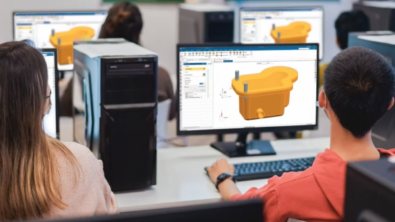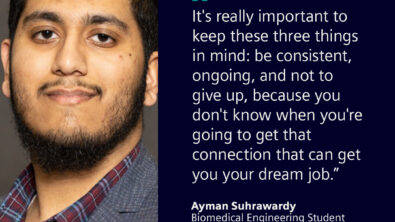Learn how Siemens is supplementing traditional engineering programs with a new ABET-recognized credential program

Earlier today, Siemens Digital Industries Software announced its first industry credential program to be piloted for ABET recognition. The program is designed to bolster students’ career readiness and help industry leaders build stronger talent pipelines. ABET, also known as The Accreditation Board for Engineering and Technology, is a nonprofit, non-governmental agency responsible for accrediting programs in applied and natural science through a quality assurance process.
As part of Siemens’ program, specific credentials will be included in the ABET pilot. The first credential for ABET recognition represents a strategic collaboration with the University of Colorado Boulder (CU-Boulder) to increase impact and opportunities for students around sustainability.
Separately, Siemens will also collaborate on a credential for the future workforce with Pennsylvania State University (Penn State), underlining our commitment to bridging the gap between education and industry. These credential programs are an exciting step in our efforts to address one of the most pressing challenges facing manufacturers: the growing skills gap in virtually every industry.
In fact, according to the World Economic Forum’s ‘Future of Jobs’ report, 60% of businesses are holding back on transforming their business because of local skills gaps.
If you’re wondering what the credentials will cover, what it means to be ABET-recognized and how this initiative will transform the future workforce, read on to learn more.
Siemens credentials drive workforce readiness by supplementing traditional degree programs
Siemens credentials are specialized certifications that focus on a specific skill or knowledge area, providing individuals with targeted expertise on relevant topics.
In commercial environments, demand is growing for credentials that can supplement traditional degree programs to cover emerging technologies, multidisciplinary subjects and even interpersonal skills like leadership, communication and project management.
This credential program will connect the dots between theory and practice for engineering students, filling gaps that may otherwise challenge new graduates in the workforce. Students will have the chance to gain critical knowledge and skills for succeeding in the rapidly evolving engineering and tech industry while obtaining recognized credentials. In brief, Siemens is making it easier than ever for learners to jumpstart their careers.
With ABET recognition, employers can rest assured Siemens credentials translate to practical knowledge and skills
The ABET pilot of a quality review process for Siemens industry credentials means that they will meet defined standards of quality, and that employers can trust these credentials to demonstrate that learners have gained valuable real-world skills.
In short, this credential program will help create a hiring pool of individuals with a deeper understanding of industry needs. As a result, businesses will be able to hire college graduates who are more prepared to hit the ground running, maximizing productivity and efficiency from day one.
Furthermore, employers will have the chance to partner with Siemens to provide input that ensures our credentials meet their needs. By working together, we can revolutionize the way we prepare future engineers to create a stronger, more competitive workforce.
Empowering graduates to hit the ground running in industry settings
As part of the effort to give graduates the skills and qualifications needed to drive results in the workplace, our credentials will focus on key areas critical to understanding and operating in industry environments.
CU-Boulder will offer a nine-course graduate credential in Sustainability and the Circular Economy with support and content from Siemens. Topics will include applied sustainability engineering, leading a circular business, sustainable supply chains and operations management and product and packaging design for the circular economy, among others. Students are invited to sign up for the course today.
Integrating Siemens’ content and expertise, Penn State will launch a series of four credential courses for engineering career preparation covering smart manufacturing, project management, business acumen and inclusive leadership. This blend of technical and interpersonal skills will play a critical role in preparing students to be able to translate theory into results on the job.
Other credentials offered by Siemens will focus on developing digital mindset and skillsets.
Industry recognized credentials are just one part of Siemens’ greater efforts to address the skills gap
We’re truly excited about the launch of this credential program, but it’s just the tip of the iceberg. As an organization, Siemens Digital Industries Software offers a variety of resources to help educators inspire the next generation of engineers while increasing workforce preparedness.
From fully granted and discounted industrial-strength software portfolios to online training and curricula, we are committed to empowering lifelong learners to create a more innovative and sustainable future.
If you’re interested in learning more about Siemens’ credential program and how our academic and industry partnerships are transforming the future workforce, then fill out the form.
Siemens Digital Industries Software helps organizations of all sizes digitally transform using software, hardware and services from the Siemens Xcelerator business platform. Siemens’ software and the comprehensive digital twin enable companies to optimize their design, engineering and manufacturing processes to turn today’s ideas into the sustainable products of the future. From chips to entire systems, from product to process, across all industries. Siemens Digital Industries Software – Accelerating transformation.


